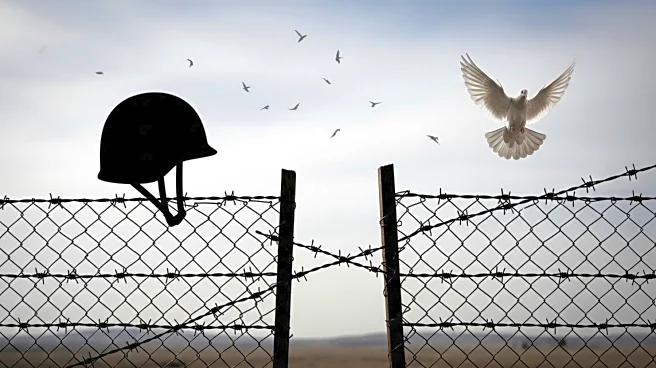What's Happening?
The Israeli military agency has announced a reduction in humanitarian aid deliveries to Gaza, citing delays in the return of deceased hostages by Hamas. The decision comes as a response to what Israel perceives as a violation of the ceasefire agreement, which stipulated the return of hostages within a specific timeframe. Recently, four deceased hostages were handed over to Israeli authorities, but the pace of returns has been slower than expected. The United Nations and U.S. officials have been informed of the aid cuts, which will see the number of aid trucks reduced by half. This development follows the release of living hostages and Palestinian prisoners as part of the ceasefire's initial phase.
Why It's Important?
The reduction in aid to Gaza has significant implications for the humanitarian situation in the region, which is already facing severe challenges. The decision to cut aid could exacerbate the conditions for civilians in Gaza, potentially leading to increased tensions and undermining the fragile ceasefire. The move also highlights the complexities of negotiating peace and the challenges in ensuring compliance with ceasefire agreements. The situation is further complicated by the political dynamics involving the U.S., Israel, and Hamas, with President Trump expressing concerns over the slow return of hostages and warning Hamas about potential disarmament actions.
What's Next?
The next steps involve continued negotiations and pressure on Hamas to expedite the return of deceased hostages. The Israeli government and international mediators are likely to engage in further discussions to address the humanitarian needs in Gaza while ensuring compliance with the ceasefire terms. The situation remains fluid, with potential for further diplomatic interventions or adjustments to aid policies based on developments in the hostage return process. Stakeholders, including the United Nations and humanitarian organizations, will be closely monitoring the impact of aid reductions on the civilian population in Gaza.
Beyond the Headlines
The ongoing conflict and humanitarian crisis in Gaza raise broader questions about the future governance and reconstruction of the territory. The ceasefire agreement includes provisions for the administration of Gaza by Palestinian technocrats, but long-term solutions for peace and stability remain uncertain. The humanitarian needs are immense, with estimates suggesting that rebuilding Gaza will require substantial financial resources. The situation also underscores the need for international cooperation and support to address the complex challenges facing the region.










